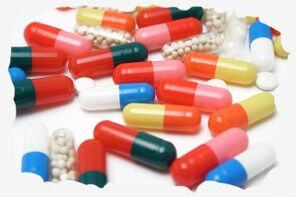
The basis of the treatment of prostate adenoma is the appointment of various drugs for prostatitis.
The complexity of treating this disease lies in the variety, and sometimes complexity, of the causes of its occurrence. Therefore, before prescribing drugs for the treatment of prostatitis, a man is sent for testing to accurately determine the cause of the disease in this particular case.
And even with a correct and accurate diagnosis of prostate adenoma, treatment with drugs can last for years in some cases. Independent attempts to get rid of the inflammation of the gland only contribute to the transition of the disease into a chronic form.
Groups of drugs for prostatitis:
- antibacterial;
- nonsteroidal anti-inflammatory;
- hormonal;
- antispasmodics;
- alpha blockers;
- muscle relaxants;
- herbal preparations;
- bioregulatory peptides.
Treatment of prostate adenoma with antibacterial drugs is prescribed if the inflammatory process was caused by a bacterial infection.
To date, 7 groups of antibiotics can be prescribed for acute and chronic inflammation of the prostate caused by a bacterial infection:
- Proprietary penicillins - taken at 1000 mg twice a day for 10 days with an interval of 12 hours between doses.
- III. Generation - taken intravenously 2 ml 1 time per day or intravenous / intramuscularly 1 ml 2 times per day for 10 days.
- IV generation cephalosporins - take 2 ml intramuscularly or intravenously once a day for 7 days.
- Aminoglycosides - take 1 ml intramuscularly 1 time per day for a week.
- Fluoroquinols II Generation - take 200 mg twice a day for 1-2 weeks.
- Fluoroquinols III Generation - Take 1 tablet per day at a dosage of 500 mg for 5 days.
- Macrolides - taken twice a day, 500 mg for 14 days.
In parallel with the appointment of antibiotics, prostatitis in men is treated with NSAIDs. Nonsteroidal anti-inflammatory drugs for prostatitis in men are prescribed to reduce inflammation in the gland and eliminate pain.
If NSAIDs do not cope with the function assigned to them, the patient is prescribed hormonal drugs for prostate adenoma.
Since urinary stagnation is observed in patients with prostate adenoma, men are also prescribed drugs for prostatitis that would improve the outflow of urine (alpha-adenoblockers). It is important to understand that alpha-blockers do not cure the disease, but only eliminate the symptoms caused by it (acute and chronic urinary retention) by relaxing the smooth muscle of the urethra.
In addition to these drugs, with prostate adenoma, various antispasmodics are often prescribed, which can eliminate pain, improve microcirculation and normalize the outflow of gland secretions by relaxing vascular smooth muscles.
Due to pain in a patient with prostate adenoma, a reflex spasm of the perineal muscles occurs, which in the future only complicates the clinical picture, makes urination even more difficult, and increases the pain syndrome. To avoid this and feel better, the patient is prescribed muscle relaxants.
Particular attention should be paid to a group of drugs such as bioregulatory peptides. These are new drugs for the treatment of prostatitis, which do not fight the inflammatory causative agent and do not relieve pain, but accelerate the healing process, since they stimulate the regeneration of the gland and normalize metabolic processes in them. These drugs produce bioregulatory peptides from the bovine prostate gland, so after their use the process of tissue regeneration occurs fairly quickly.
Various herbal preparations against prostatitis are also used to treat prostate adenoma. You can prepare herbal preparations yourself (decoctions, infusions) or buy ready-made herbal preparations in capsules or solutions.
Homeopathic remedies for prostatitis.
In addition to the medicines listed, homeopathic remedies are also used. Unlike other medicines, homeopathic remedies for prostatitis do not suppress the symptoms of the disease, but treat them by activating the body's defenses. Activation of the protective forces is carried out according to the principle of "treating like with like", i. e. homeopathic complex preparations cause the same symptoms as prostate adenoma, and using them in low concentration, you can stimulate the body's fight against inflammation prostate.
Monastery syrup for prostatitis
Often prostatitis worries men in adulthood. The disease manifests itself at the most inopportune moment, most often already in the chronic stage. There is discomfort, itching and pain. In addition, against the background of prostatitis, serious consequences can develop. One of the prerequisites for positive complex treatment is the inclusion of monastery syrup in therapy. Already in the third week of therapy the man is feeling much better, all the symptoms of this serious illness disappear: pain, problems with urination, inflammation. Immunity is significantly strengthened under the influence of the active components of the syrup, potency is restored, the body receives a complex of vitamins and essential trace elements. Since the drug is completely natural, many experts prescribe it to all men after 40 years for the prevention of prostatitis. This is one of the best remedies for prostatitis.
Chinese medicines for prostatitis
Due to the reputation of oriental medicine as a panacea for all diseases, many patients with chronic inflammation of the prostate are watching with interest the appearance of various Chinese medicines on the domestic market.
The only thing you really have to ask is if it can be sold in other countries.






















